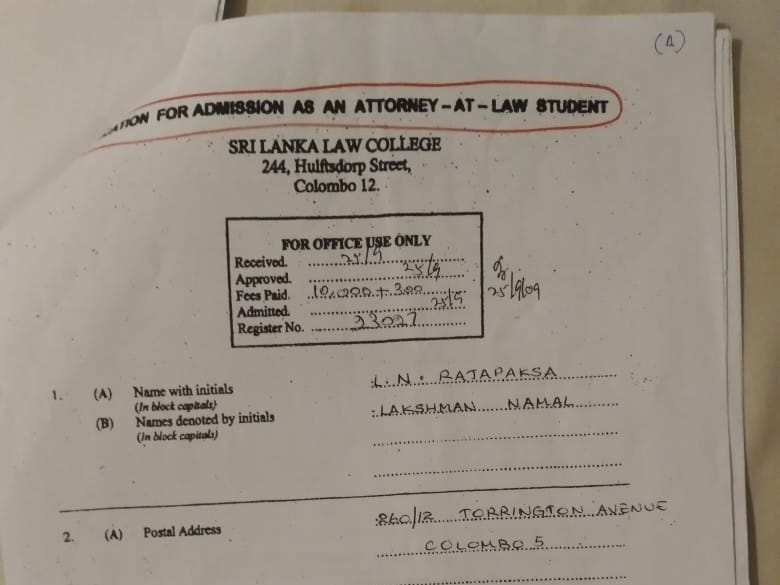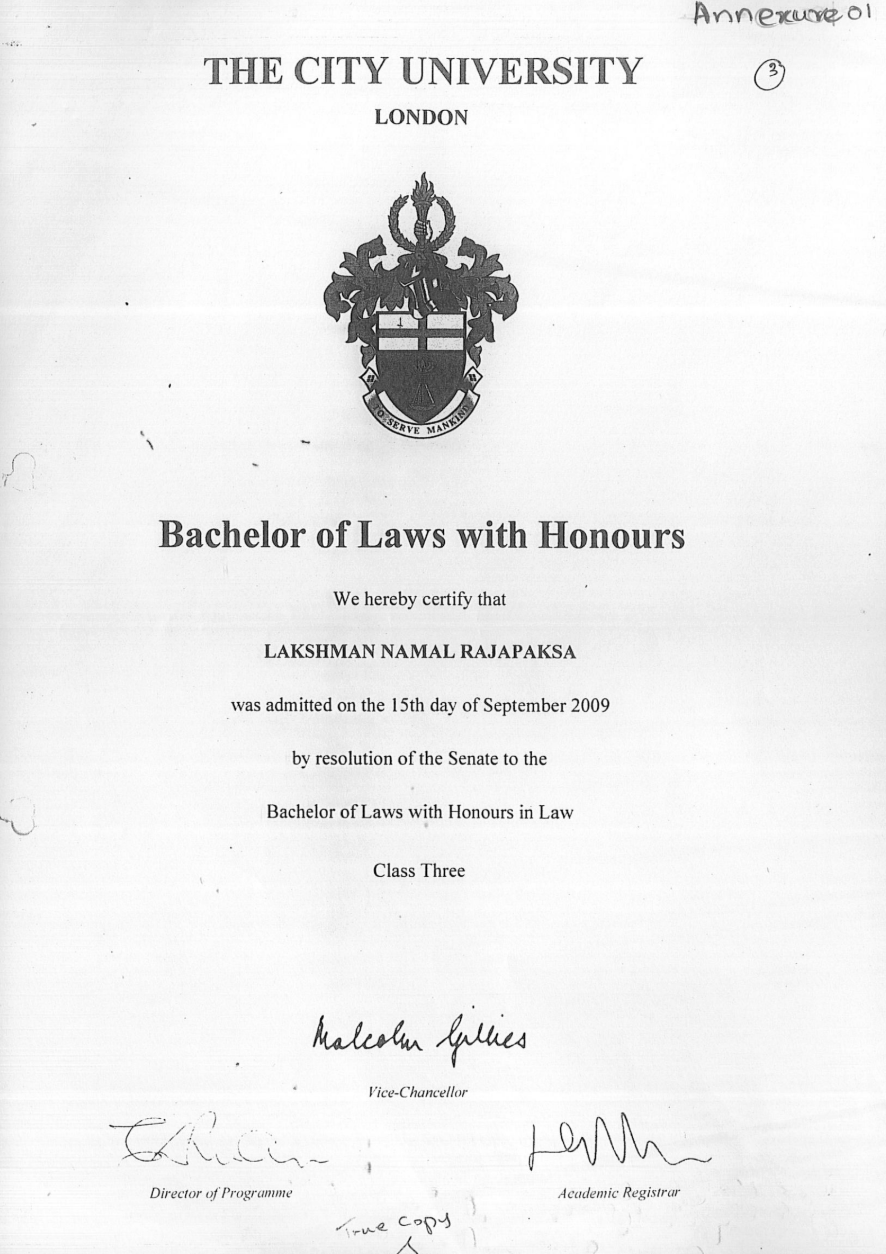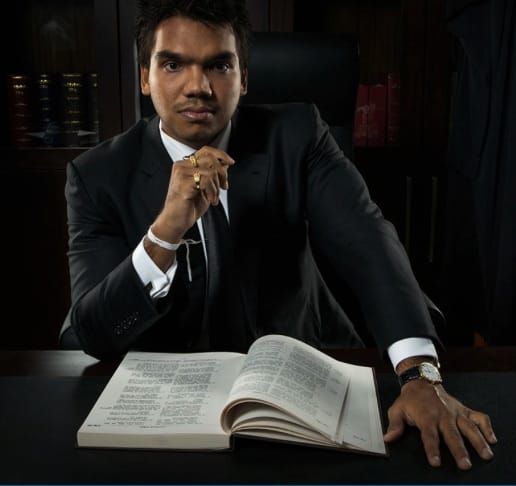Namal Rajapaksa is said to have sat for his law exams in a private classroom. But a lengthy investigation by Nirmala Kannangara unearths new evidence from the UK and Sri Lanka, suggesting he was not eligible for law college admission in the first place.
By Nirmala Kannangara/The Examiner
In 2009, Namal Rajapaksa MP didn’t meet the requirements for admission to Law College. He was admitted nonetheless.
Sixteen years later, a lengthy investigation unearths new facts about the controversial case. Namal Rajapaksa’s City University degree wasn’t sufficient for Law College admission. The degree itself suffers from multiple discrepancies.
A dubious entry
Entering Law College — the only way to become a lawyer in Sri Lanka — is no easy task. Thousands sit for its entrance exam each year with high hopes, but only a few hundred qualify.
Others are exempted from the exam, by demonstrating they have a law degree from a recognised university. It was this second route that Rajapaksa chose. He claimed to hold a law degree from City University, London.
Rajapaksa began his law degree in September 2006. Available records show he attended City University from 2006 to 2009. Upon his return home, he sought admission at the Sri Lanka Law College, on the basis that he had completed his law degree in London.
Rajapaksa submitted his application to Law College on 25 September 2009. According to the annotations on the application, it was reviewed and approved on the very same day.

But a Law College source reveals that it takes much longer to establish the authenticity of foreign qualifications. “Once the authenticity is established and the other given details are deemed accurate, we register the students at the next registration. That is the general procedure.”
They added that there was no possibility of admitting a student the very day an application was submitted.
Unrecognised degree
At the time Rajapaksa’s application was submitted and approved, his university — City University — was not recognised by Law College.
An RTI shows that Law College only began to recognise City University’s degree programme from 15 October 2009 — 20 days after Rajapaksa’s enrolment.
Principal Sri Lanka Law College, Prasantha Lal De Alwis PC, says there’s “no way” that the Council of Legal Education’s provisions allow a student entry to the college with a degree from an unrecognised university.
Incomplete application
Additionally, Rajapaksa’s application to Law College was incomplete.
Applying to Law College via the law degree route requires both a transcript and a degree certificate. But Law College never received Rajapaksa’s degree certificate, only his transcript.

On 3 October 2025, in response to an RTI request for Rajapaksa’s application, Law College confirmed that there is no degree certificate in Rajapaksa’s file. Instead, Law College has a letter from 2009, addressed to Rajapaksa by City University.
The letter states: “I am pleased to inform you that you have satisfied the Assessment Board in all requirements of the programme and are awarded a Bachelor of Laws in Law, Class Three.”
And also insufficient
Even if Rajapaksa did have the degree he claimed to hold, the degree was not sufficient for Law College admission.
In 2009, the admission requirement for foreign universities was “that the degree is recognised as an entry qualification for a course of professional studies for admission to the Bar in the country in which such degree was obtained.”
Rajapaksa’s degree from the UK would not have met the entry qualifications needed to enter the UK bar.
The Bar Standards Board regulates this process in the UK. The board’s requirements for the academic stage notes that “the standard requirement for completion of the academic stage is a 2ii UK Honours degree or its equivalent” ” A 2ii is a Lower-Second Class Honours Degree.
Rajapaksa, based both on his transcript and on the letter from City University, holds a ‘Class 3’ or ‘Third Class’ degree. This would not have satisfied the UK’s requirements for the bar. Therefore, it would not have satisfied the requirement for Law College admission without sitting the entrance exam either.
De Alwis, Law College’s principal, when contacted in connection with this story, said that he cannot share details about students’ qualifications. “The CID is conducting an investigation on Rajapaksa’s qualifications, and has recorded two statements from me and one statement from Deputy Principal Shehan Perera.”
An unusual degree certificate
While Rajapaksa did not submit a degree certificate to Sri Lanka Law College, he did so in his Jayewardenepura University master’s application.
This certificate, obtained via RTI, states that Rajapaksa was conferred a law degree from City University “with Honours in Law Class Three.”

The degree certificate is unusual. It was signed on 15 September 2009 by “Malcolm Gillies, Vice Chancellor”, but Gillies resigned as Vice Chancellor from the university in July 2009.
When contacted, Gillies said: “I am not aware of any certificates issued after I left the university that carry my signature.”
City University also confirmed that the interim Vice Chancellor serving at the time was Prof. Julius Weinberg, not Gillies.
The law degree transcript that Rajapaksa sent to the Law College was not included in his application to Jayewardenepura University.
The transcript Rajapaksa submitted to Law College and the degree submitted to Jayewardenepura University don’t tally. The transcript obtained from Law College says he has a “Class Three” classification, while the degree certificate obtained from Jaywardenapura University says he has Class Three “with honours.”
When asked for clarification, City University said: “If the transcript includes a qualification, then the award title would include with Honours if this was applicable.”
Besides his law degree, his master’s application claims a ‘Master of Arts Qualifying (MAQ)’ certificate from Jayewardenepura University. A senior Jayewardenepura official finds this unusual. If he has an honours degree, why sit for the MAQ? He could have secured master’s admission with just a law degree, they say.
Despite multiple attempts to secure comment for Rajapaksa since April 2025, he did not respond.
Rajapaksa went on to score top marks at Law College. He was awarded the subject prize for law of obligations.
But his track record at the City University of London doesn’t reflect his later achievements. He barely passed several subjects, including Land and Tort Law and Employment Law II, Family Law, and Child Law.
In 2010, Thushara Jayaratne, a fellow Law College student, alleged that Rajapaksa cheated on his law college exams by sitting for them in private. The results of a Law College inquiry, chaired by Uditha Igalahewa, were never made public. Igalahawa declined to comment.
Rajapaksa has consistently denied these allegations.
